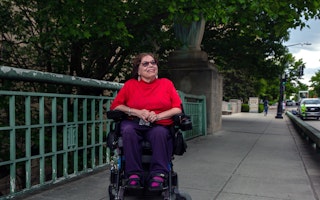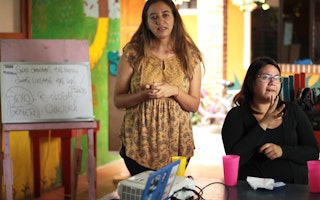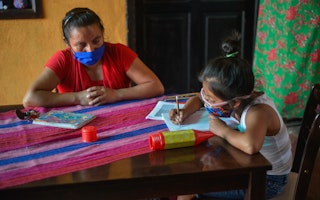Q&A: A Different Approach to Disability

In October 2020, Gerard Quinn—a rights advocate, researcher, and law professor—was appointed as the UN Special Rapporteur on the Rights of People with Disabilities. As Special Rapporteur, Gerard plays a lead role in educating governments about what they can do to safeguard the rights of people with disabilities. He spoke to Open Society’s Alison Hillman about how he hoped to use his office to advocate for a more inclusive, more equal world.
In the context of defending disability rights, what do we mean by inclusivity? And what are its implicit obligations?
This is a foundational concept. When we talk about inclusivity we mean, I count as a person. Take me seriously. It’s as basic as that.
Throughout legal history, people with disabilities are not treated seriously as persons. They are not alone in this, of course, but one of the last bastions for ascribing lesser moral worth still applies to people with disabilities.
So how can policymakers, judges, and others act in a way that is inclusive?
They treat my difference as a positive thing. Difference should not lead to exclusion or segregation, or other negative treatment. This concept of treating difference positively was one of the early hallmarks in U.S. disability law, especially with the innovation of reasonable accommodation.
Yes, say more about reasonable accommodation. It sounds good, but some of our readers may not know what it is.
It is the idea that adjustments need to be made to make systems accessible and fair to individuals with different needs. It is the idea that duty-holders have an obligation to treat difference positively. It is a bedrock of U.S. antidiscrimination law and is now a core foundational feature of the UN Convention on the Rights of Persons with Disabilities, passed in 2008.
It flips the notion of disability on its head, suggesting that disability is not about a person’s innate capabilities but about the way a society is organized and the laws that govern them. Disability is often not about people, it’s about choices societies make.
So you need to make sure that social, economic, political, and cultural arrangements are organized to make space for me.
This has enormous implications for building back post pandemic?
Yes, we need to consciously think through where some of the blockages were in the past and commit to undoing them. As much as we are building something new for the future, build it with me in mind.
This is a visibility project. I count, I am here. You will find that it is not just the right thing to do but it is also the efficient thing to do because when everybody feels that they belong, you build a much more sustainable economy and social future for your country.
How is disability rights advocacy today different than when you started your work in the field more than 30 years ago?
When I first got started in the late ’80s and early ’90s, we had a simplistic assumption at the core of our work. We thought, if we address equality of opportunity and if we address non-discrimination, then all our problems will be solved. We put all our eggs in one basket.
In drafting the UN Convention, many people with disabilities emphasized that the struggle for equal opportunities was not enough.
They argued that we can deal with all of the ripple effects of exclusion, but if we are not dealing with the core engine that is generating exclusion in the first place, then what is the point? You have to deal with root causes.
The net result: ideas about personhood began to take center stage in the drafting of the Convention and have been central to defending the rights of people with disabilities ever since.
Do you see the notion of the “personhood” of people with disabilities as a continuing challenge today?
Yes, it’s an enormous challenge. When you think about it, this notion of personhood is a revolutionary concept. You are taking power away from someone and giving it back to others.
Systems and apparatus have grown up used to certain power arrangements, so it is intrinsically difficult to change.
Even though philosophy and hard science have settled these questions. The law and policy making have not.
It has always been fascinating to me that evidence-based policymaking does not happen in this sphere. If it did, then governments would say to themselves, “Why are we so hung up with putting people through the hoops of trying to prove that they have a cognitive or rational ability when most of our own decision making does not draw on rational skills?”
Voting is a great example. I always say to my students, “Hands up if you are married.” Then I say, “Did you rationally think through the logical consequence of your choice of spouse?”
Of course, you did not. That is not the way human beings function. So it is an odd disjuncture between modern science, which is showing us how human beings behave, and the suppositions of law and public policy, which is very much rooted in a historical moment in time. It seems to me that we have been waiting a very long time to get rid of that picture of the human being. Behavioral economics has done it—law and public policy have yet to do it.
During the pandemic, how has all this played out for people with disabilities?
What we have seen is that we kind of fooled ourselves into thinking that the UN Disability Convention—ratified by 182 countries—had sunk deep roots across the world.
But it is in moments of crisis that you see reality. And the reality is that during the moment of crisis with COVID, the system began to behave as it had for decades, if not centuries.
It was as if the rights of people with disabilities was a luxury or a side constraint. It was something to be kept at arm’s length; not something that should have been a natural reflex of the system. And I think we have seen that in a number of ways.
The service paradigm that was in place to enable some people with disabilities to flourish even modestly in their communities was simply kicked away. Nothing was put in its place.
Secondly, we saw rampant unequal treatment when it came to health care decisions and triage decisions in difficult circumstances. I do not put that down to malevolence on the part of the medical profession and doctors.
We forget that the professional training and socialization of these professions had not changed just because a UN Convention was adopted.
So they did not logically think through:
- “What are the implications for people with disabilities?”
- “Why are we using outdated frailty indexes to make hard ethical decisions?”
- “What implicit biases are embedded in our practices, and even in our socialization as a profession?”
And also, this applies as much if not more to older people as to people with disabilities.
We saw firsthand the exposure to risk of the disease that is endemic in congregated or institutionalized settings. It is really interesting that alongside a human rights argument against institutionalization now sits a public health argument against institutionalization.
It is a bigger revolution for older people. There are a lot of elder rights groups that hitherto would have supported institutionalization in some form, but they are changing their minds. It is fascinating to see the tectonic plates shifting because of COVID.


